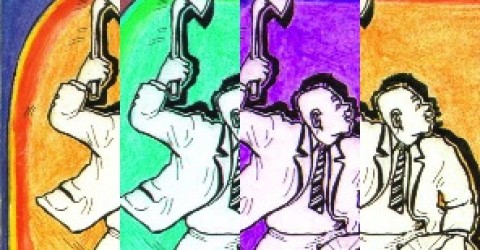Too often people think that Civil Society are formal NGO’s: following Habermas’ theory of public sphere we take civil society as a space rather than a set of organisations. It may be thus termed the civil domain. Civil domains are nested in a larger sphere, the arena. In this arena conflicts of power are fought out – in cold and hot wars. This two-sphere model lends itself to an analysis of power in and around a country or an issue.
Many constraints arise in the interplay of economic, political and military forces in a ‘public arena’, where state and non-state actors contest for power in ways strongly influenced by geo-politics. Oil and diamonds, etc. as well as security. In that sense natural resources have – de facto – the same effect as development aid (especially where it is used for budget or sector support). The effect is disastrous for democracy in a way that Dambisa Moyo describes as the ‘reversed Boston tea party’: ‘no representation without taxation’: money for public expenditure does not come from the local taxpayer but comes ‘from above’: ergo: the government holds the civilians ransom, the base for clientelism is there.
International development agencies are currently fixated on project-based strategies, including support to NGOs as vehicles for relief and ‘development’ services and for ‘advocacy’. We argue that the priorities should instead fall on domains and arenas: multiple – courageous – actors, rather than institutes.
We – as development practitioners – have a problem here, that cannot be solved simply and that is mainly given by the catch 22 we’re in: we know that we should support activists and grassroots organisations, but our money comes from governments that have made accountability more important than effectiveness …
Because of the sometimes absurd regulations we are almost obliged to spend the money to large NGO’s that we know to be ineffective…. (but write good reports…).
So I don’t know the solution for the overall problem, but I know that some – smaller – northern NGO’s are trying to bridge the gap I described and that sometimes through ‘umbrella NGO’s’ the money can effectively end up where it needs to be.
What my argument boils down to: let’s act together, let’s go on, or let’s find more ways to support those people who deserve our support and to people that have the courage to enlarge the public domain trough media, public debates and everything the like.
We admire courageous people in non-democratic and corrupt states – so let’s try to be a little bit courageous and defy the actual discourse in international cooperation where it works to the detriment of those who really need it.
Leave a comment
No comments yet.

Leave a comment